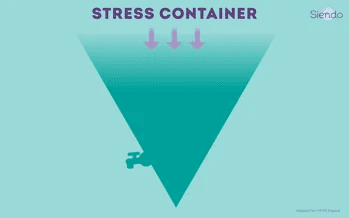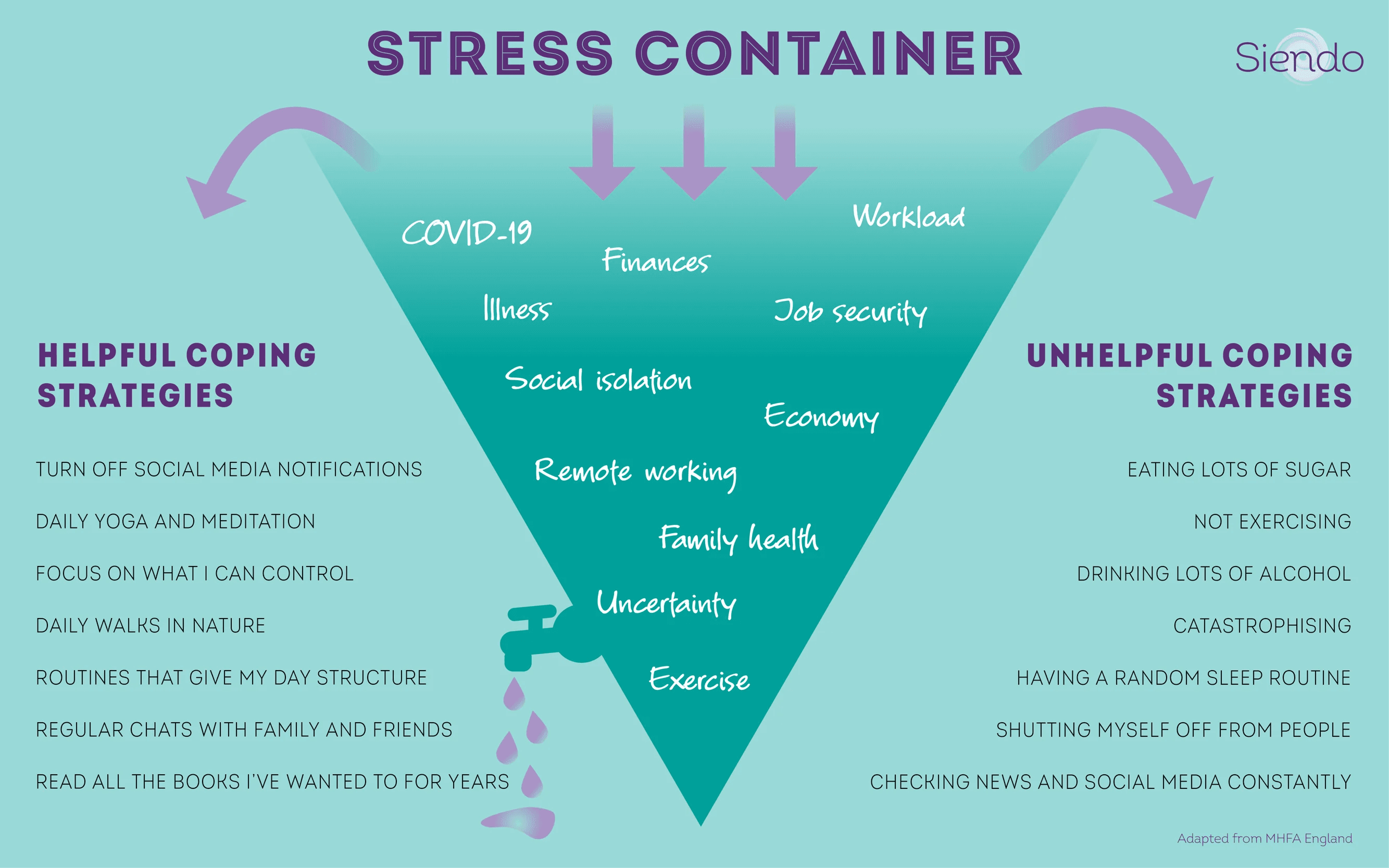...
...
...
...
...

We all experience stress in and outside of work, but differ in our ability to cope.

Hannah Clemens
Apr 4th, 2023
The NHS defines stress as “the feeling of being overwhelmed or unable to cope with mental or emotional pressure”.
Pressure exists in all aspects of our life from our work to our relationships and sometimes it can actually be a positive thing that motivates us to grow and push ourselves out of our comfort zones.
However, without the appropriate coping mechanisms to manage it, this pressure can build up and up and up until it boils over and we can begin to feel “stressed” and burnt out. Such excessive and ongoing stress affects the entire body and is a risk factor for various health conditions such as heart disease, dementia, depression, anxiety, and stroke.

This is a great model, designed by MHFA England, to understand your 'coping abilities' when it comes to dealing with stress.
The idea is that we all have our own individual stress containers - some are bigger than others and they are all filled differently.
Various stressors are continuously flowing into the top of your container, whether they are personal or professional and whether they are within your control or outside of your control.
Over time, your container starts to fill up. If you’re not careful to alleviate some of this pressure, your container may start to overflow, causing you to become stressed, burnt out, and overwhelmed.

The extent of this depends on two things:
1) Your vulnerability to stress. Your container has a unique size that depends on your life experiences and circumstances. The smaller the container, the quicker your container fills up and the higher your vulnerability to stress.
2) The coping strategies you are able to use to help you manage stress. Think of them as tabs to ‚drain out’ some of the stressors that are filling your container. They may not be able to prevent the stressors from coming in, but they equip you to be able to manage them and prevent the overflow.
Be mindful of engaging in unhealthy coping strategies - things that seem to alleviate that pressure in the short-term but actually contribute to even more pressure and stress in the long-term.
If you are interested in learning more, you can try out MHFA's interactive stress container tool here.
There are various physical, psychological, and behavioural warning signs you can look out for that suggest you, or someone you know, may be experiencing stress or overwhelm.
Some of these are:
Physical:
Psychological:
Behavioural:
Please note, one or two of these things in isolation are unlikely to indicate a serious issue. It's important to watch out for an increased frequency or severity of these.
In honour of Stress Awareness Month, which has been held every April since 1992, here are some coping strategies research suggests you do to reduce your stress levels:
And last, but not least, look for support! There are various helplines and support services you can reach out to if you are struggling or that you can signpost others to. You can find an overview here.
Similar to pressures in our personal life, experiencing some level of stress at work isn’t necessarily bad. It can help us stay focused and motivate us to tackle new challenges. But as the stress container illustrates, there is a point when the stressors we face get too much and turn into overwhelm.
Common causes of workplace stress can be divided into work content and work context:
Work content
Work context
Sadly, it is very common to face a high number of above stressors at work. Constant pressures like high workload and unexpected deadlines should not be the norm and aren’t things that individual team members can easily fix to alleviate stress. They require changes at an organisational level.
For example, good workplace culture should involve managers communicating openly and honestly about expectations, responsibilities, and organisational change with their team members. There should be safe and confidential spaces for employees to share their concerns and they should have the opportunity to connect with each other outside of work tasks.
For this Stress Awareness Month, why not try and have a conversation with your teams to learn about their personal stressors? This can then help you support each other to keep those stress containers from overflowing.

Rouberto Pereira
Dec 12th, 2024

Understanding the Link Between Sleep, Mental Health, and Daily Wellbeing
Keeva Galway
Mar 5th, 2025

Rouberto Pereira
Apr 3rd, 2025